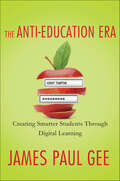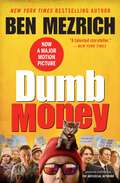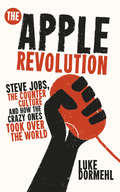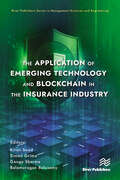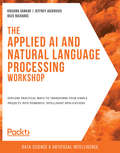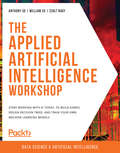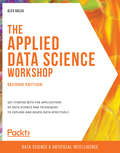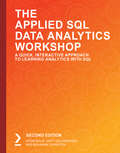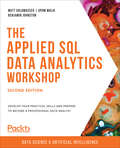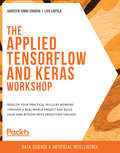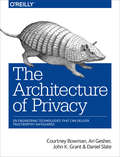- Table View
- List View
The Animator’s Sketchbook: How to See, Interpret & Draw Like a Master Animator
by Tony WhiteThe Animator’s Sketchbook will teach students of animation how to improve their work through observation and drawing. It will show readers how to access their inner "animator." With over 60 different gesture and drawing exercises, this book enhances vision, analysis, understanding, and the core skills required to become a master animator. Filled with extensive practice pages, Tony White’s Sketchbook, invites students to demonstrate what they learn. Each exercise is timed, so that the skills acquired, are optimized for efficiency and comprehension. The style and technique of the art produced will be entirely up to the reader, thus making no two sketchbooks alike. Key Features Provides readers with their own personal sketchbook, demonstrating classical art skills that are highly prized by studio employers Readers will come away better visualizing form, gesture, pose and expression Includes 60 speed and gesture drawing exercises Provides the perfect way for students of animation to improve their core skills Perfect for animation instructors who can rely on this unique course workbook to take their students to new levels of classic visualizing expertise
The Anti-Education Era: Creating Smarter Students through Digital Learning
by James Paul GeeOne of the first champions of the positive effects of gaming reveals the dark side of today's digital and social media Today's schools are eager to use the latest technology in the classroom, but rather than improving learning, the new e-media can just as easily narrow students' horizons. Education innovator James Paul Gee first documented the educational benefits of gaming a decade ago in his classic What Video Games Have to Teach Us About Learning and Literacy. Now, with digital and social media at the center of modern life, he issues an important warning that groundbreaking new technologies, far from revolutionizing schooling, can stymie the next generation's ability to resolve deep global challenges. The solution-and perhaps our children's future-lies in what Gee calls synchronized intelligence, a way of organizing people and their digital tools to solve problems, produce knowledge, and allow people to count and contribute. Gee explores important strategies and tools for today's parents, educators, and policy makers, including virtual worlds, artificial tutors, and ways to create collective intelligence where everyday people can solve hard problems. By harnessing the power of human creativity with interactional and technological sophistication we can finally overcome the limitations of today's failing educational system and solve problems in our high-risk global world. The Anti-Education Era is a powerful and important call to reshape digital learning, engage children in a meaningful educational experience, and bridge inequality.
The Anti-HDR HDR Photography Book: A Guide to Photorealistic HDR and Image Blending
by Robert FisherThe Anti-HDR HDR Photography Book contains everything you’ll need to know in order to get the best results from your High Dynamic Range images. Designed for those who want to extend the dynamic range in their work, but are frustrated by over-processed and hyper-saturated images, this book proves that HDR techniques are capable of producing photographs that are both stunning and realistic. In addition to helping you choose the right equipment and settings to optimize your shoot for HDR, the book explains how to use post-processing software to create natural-looking photographs, blend source images with layer masks, and establish an efficient workflow. By teaching you to effectively use all the most important tools of HDR, it will expand the scope of your portfolio and allow you to create images that you never thought were possible. Key features include: What to look for when choosing a camera for HDR Description of gear that is important to the HDR photographer How to use the HDR software applications Photomatix and SNS-HDR Pro to achieve natural-looking results Discussion of blending multiple source images using simple masks and techniques An in-depth examination of the use of Luminance Masks for blending and editing bracketed images to a photorealistic composite Guide to workflow, from organizing images on the computer to pre-merge editing of RAW files using both Adobe Lightroom and Adobe Bridge The use of black-and-white in HDR and image-blending, including ways to convert color images to black-and-white
The Antikythera Mechanism: The Story Behind the Genius of the Greek Computer and its Demise
by Evaggelos G. VallianatosIn Antikythera Mechanism: The Story Behind the Genius of the Greek Computer and Its Demise, Evaggelos G. Vallianatos, historian and ecopolitical theorist, shows that after the conquest of Persia by Alexander the Great in the late fourth century BCE
The Antisocial Network: The GameStop Short Squeeze and the Ragtag Group of Amateur Traders That Brought Wall Street to Its Knees
by Ben MezrichFrom one of our most innovative and celebrated authors, the definitive take on the wildest story of the year— the David-vs.-Goliath GameStop short squeeze, a tale of fortunes won and lost overnight that may end up changing Wall Street forever.Bestselling author Ben Mezrich offers a gripping, beat-by-beat account of how a loosely affiliate group of private investors and internet trolls on a subreddit called WallStreetBets took down one of the biggest hedge funds on Wall Street, firing the first shot in a revolution that threatens to upend the establishment.It&’s the story of financial titans like Gabe Plotkin of hedge fund Melvin Capital, one of the most respected and staid funds on the Street, billionaires like Elon Musk, Steve Cohen, Mark Cuban, Robinhood co-CEOs Vlad Tenev and Baiju Bhatt, and Ken Griffin of Citadel Securities. Over the course of four incredible days, each in their own way must reckon with a formidable force they barely understand, let alone saw coming: everyday men and women on WallStreetBets like nurse Kim Campbell, college student Jeremy Poe, and the enigmatic Keith &“RoaringKitty&” Gill, whose unfiltered livestream videos captivated a new generation of stock market enthusiasts.The unlikely focus of the battle: GameStop, a flailing brick-and-mortar dinosaur catering to teenagers and outsiders that had somehow held on as the world rapidly moved online. At first, WallStreetBets was a joke—a meme-filled, freewheeling place to share shoot-the-moon investment tips, laugh about big losses, and post diamond hand emojis. Until some members noticed an opportunity in GameStop—and rode a rocket ship to tens of millions of dollars in earnings overnight.In thrilling, pulse-pounding prose, THE ANTISOCIAL NETWORK offers a fascinating, never-before-seen glimpse at the outsize personalities, dizzying swings, corporate drama, and underestimated American heroes and heroines who captivated the nation during one of the most volatile weeks in financial history. It&’s the amazing story of what just happened—and where we go from here.
The Antitrust Paradigm: Restoring a Competitive Economy
by Jonathan B. BakerAt a time when tech giants have amassed vast market power, Jonathan Baker shows how laws and regulations can be updated to ensure more competition. The sooner courts and antitrust enforcement agencies stop listening to the Chicago school and start paying attention to modern economics, the sooner Americans will reap the benefits of competition.
The Antivirus Hacker's Handbook
by Elias Bachaalany Joxean KoretThe book focusses on how to reverse engineer antivirus software, detect vulnerabilities and exploit them. This knowledge can benefit both an attacker (legal or otherwise, as happens with any kind of knowledge) as well as antivirus software vendors. It's composed of the following sections: Reverse engineering antivirus software Antivirus software evasion Attacking antivirus software Exploiting antivirus software Conclusions about current state-of-the-art of antivirus software Recommendations to both users and vendors
The Apple Revolution: Steve Jobs, the Counterculture and How the Crazy Ones Took over the World
by Luke DormehlOn 26 May, 2010 Apple Inc. passed Microsoft in valuation as the world's largest technology company. Its consumer electronic products - ranging from computers to mobile phones to portable media devices, not to mention its iTunes, iBook and App Store - have influenced nearly every facet of our lives, and it shows no sign of slowing down. But how did Apple - a company set up in the back room of a house by two friends, and one that always marketed itself as the underdog - become the marketplace leader (and the world's second largest company overall), and is it a good thing to have one company hold so much power? In The Apple Revolution Luke Dormehl shares the inside story of how Apple Inc. came to be; from the formation of the company's philosophies and user-friendly ethos, to the "iPod moment" and global domination, leaving you with a deep understanding of how it was created, why it has flourished, and where it might be going next.
The Application of Artificial Intelligence: Step-by-Step Guide from Beginner to Expert
by Zoltán SomogyiThis book presents a unique, understandable view of machine learning using many practical examples and access to free professional software and open source code. The user-friendly software can immediately be used to apply everything you learn in the book without the need for programming.After an introduction to machine learning and artificial intelligence, the chapters in Part II present deeper explanations of machine learning algorithms, performance evaluation of machine learning models, and how to consider data in machine learning environments. In Part III the author explains automatic speech recognition, and in Part IV biometrics recognition, face- and speaker-recognition. By Part V the author can then explain machine learning by example, he offers cases from real-world applications, problems, and techniques, such as anomaly detection and root cause analyses, business process improvement, detecting and predicting diseases, recommendation AI, several engineering applications, predictive maintenance, automatically classifying datasets, dimensionality reduction, and image recognition. Finally, in Part VI he offers a detailed explanation of the AI-TOOLKIT, software he developed that allows the reader to test and study the examples in the book and the application of machine learning in professional environments.The author introduces core machine learning concepts and supports these with practical examples of their use, so professionals will appreciate his approach and use the book for self-study. It will also be useful as a supplementary resource for advanced undergraduate and graduate courses on machine learning and artificial intelligence.
The Application of Emerging Technology and Blockchain in the Insurance Industry (River Publishers Series in Management Sciences and Engineering)
by Simon Grima Balamurugan Balusamy Kiran Sood Ganga SharmaThis book is a unique guide to the disruptions, innovations, and opportunities that technology provides the insurance sector and acts as an academic/industry-specific guide for creating operational effectiveness, managing risk, improving financials, and retaining customers. It also contains the current philosophy and actionable strategies from a wide range of contributors who are experts on the topic. It logically explains why traditional ways of doing business will soon become irrelevant and therefore provides an alternative choice by embracing technology. Practitioners and students alike will find value in the support for understanding practical implications of how technology has brought innovation and modern methods to measure, control, and evaluation price risk in the insurance business. It will help insurers reduce operational costs, strengthen customer interactions, target potential customers to provide usage-based insurance, and optimize the overall business. Retailers and industry giants have made significant strides in adopting digital platforms to deliver a satisfying customer experience. Insurance companies must adjust their business models and strategies to remain competitive and take advantage of technology. Insurance companies are increasingly investing in IT and related technologies to improve customer experience and reduce operational costs. Innovation through new technologies is a key driver of change in the financial sector which is often accompanied by uncertainty and doubt. This book will play a pivotal role in risk management through fraud detection, regulatory compliances, and claim settlement leading to overall satisfaction of customers.
The Application of Formal Methods: Essays Dedicated to Jim Woodcock on the Occasion of His Retirement (Lecture Notes in Computer Science #14900)
by Augusto Sampaio Simon FosterThis Festschrift, dedicated to Jim Woodcock, contains papers written by many of his closest collaborators. After a PhD on software verification at the University of Liverpool, Jim has combined a successful career in academia with outstanding industry research, in particular he has been a pioneer in applying mathematical modelling approaches in critical industries. At GEC's Hirst Research Centre he worked on a novel distributed telephone exchange and a service specification of a PABX exchange. In Oxford he collaborated with IBM Hursley Laboratories on modelling of the CICS transaction processing system, one of the most significant software systems ever. As part of the UK government's cybersecurity strategy, he used Z techniques to develop secure office automation systems and a secure version of UNIX. He worked with the Smith Institute and BR Research to verify the safety of railway signalling systems, approaches developed further in safety-critical control systems for the UK Nuclear Installation Inspectorate and British Energy. He provided a technically complete theory of correctness for Z, verifying its soundness from first principles, and completed the verification of Mondex, a smartcard-based electronic cash system, the first application of a general theory of program correctness to an industrial product. He coordinated the experimental work of the Verified Software Initiative, an international grand challenge. More recently he extended the collection of standard Unifying Theories of Programming (UTP) with work on object orientation and hybrid systems. Currently he is working on a UTP theory of probabilistic programs with application to robotics. Jim has been a lecturer, research fellow, reader and professor at the University of Surrey, the University of Oxford, the University of Kent, and since 2004 the University of York, and he is a visiting professor at the Federal University of Pernambuco and Trinity College Dublin. He is a Fellow of the Royal Academy of Engineering, the British Computer Society, and the Formal Methods Europe association, and he was part of the team that won the Queen’s Award for Technological Achievement in 1992. He is the Editor-in-Chief of the ACM journal Formal Aspects of Computing, he has chaired major related academic conferences, and he has contributed to CCITT and Z ISO international standards. Throughout all these activities, Jim has been a guide and inspiration to colleagues and students, and collaborated successfully with researchers in the UK, Brazil, China, France, USA, Ireland, and Singapore. Many of these researchers show in their contributions to this volume the ongoing impact of his work.
The Application of Neural Networks in the Earth System Sciences
by Vladimir M. KrasnopolskyThis book brings together a representative set of Earth System Science (ESS) applications of the neural network (NN) technique. It examines a progression of atmospheric and oceanic problems, which, from the mathematical point of view, can be formulated as complex, multidimensional, and nonlinear mappings. It is shown that these problems can be solved utilizing a particular type of NN - the multilayer perceptron (MLP). This type of NN applications covers the majority of NN applications developed in ESSs such as meteorology, oceanography, atmospheric and oceanic satellite remote sensing, numerical weather prediction, and climate studies. The major properties of the mappings and MLP NNs are formulated and discussed. Also, the book presents basic background for each introduced application and provides an extensive set of references. "This is an excellent book to learn how to apply artificial neural network methods to earth system sciences. The author, Dr. Vladimir Krasnopolsky, is a universally recognized master in this field. With his vast knowledge and experience, he carefully guides the reader through a broad variety of problems found in the earth system sciences where neural network methods can be applied fruitfully. (...) The broad range of topics covered in this book ensures that researchers/graduate students from many fields (...) will find it an invaluable guide to neural network methods." (Prof. William W. Hsieh, University of British Columbia, Vancouver, Canada) "Vladimir Krasnopolsky has been the "founding father" of applying computation intelligence methods to environmental science; (...) Dr. Krasnopolsky has created a masterful exposition of a young, yet maturing field that promises to advance a deeper understanding of best modeling practices in environmental science." (Dr. Sue Ellen Haupt, National Center for Atmospheric Research, Boulder, USA) "Vladimir Krasnopolsky has written an important and wonderful book on applications of neural networks to replace complex and expensive computational algorithms within Earth System Science models. He is uniquely qualified to write this book, since he has been a true pioneer with regard to many of these applications. (...) Many other examples of creative emulations will inspire not just readers interested in the Earth Sciences, but any other modeling practitioner (...) to address both theoretical and practical complex problems that may (or will!) arise in a complex system." " (Prof. Eugenia Kalnay, University of Maryland, USA)
The Application of the Chebyshev-Spectral Method in Transport Phenomena
by Ranga Narayanan Gérard Labrosse Weidong GuoTransport phenomena problems that occur in engineering and physics are often multi-dimensional and multi-phase in character. When taking recourse to numerical methods the spectral method is particularly useful and efficient. The book is meant principally to train students and non-specialists to use the spectral method for solving problems that model fluid flow in closed geometries with heat or mass transfer. To this aim the reader should bring a working knowledge of fluid mechanics and heat transfer and should be readily conversant with simple concepts of linear algebra including spectral decomposition of matrices as well as solvability conditions for inhomogeneous problems. The book is neither meant to supply a ready-to-use program that is all-purpose nor to go through all manners of mathematical proofs. The focus in this tutorial is on the use of the spectral methods for space discretization, because this is where most of the difficulty lies. While time dependent problems are also of great interest, time marching procedures are dealt with by briefly introducing and providing a simple, direct, and efficient method. Many examples are provided in the text as well as numerous exercises for each chapter. Several of the examples are attended by subtle points which the reader will face while working them out. Some of these points are deliberated upon in endnotes to the various chapters, others are touched upon in the book itself.
The Applied AI and Natural Language Processing Workshop - Second Edition: Explore practical ways to transform your simple projects into powerful intelligent applications
by Krishna Sankar Jeffrey JackovichIf you are a machine learning enthusiast, data scientist, or programmer who wants to explore AWS's artificial intelligence and machine learning capabilities, this book is for you. Although not necessary, a basic understanding of AI and NLP will assist with grasping key topics quickly.
The Applied Artificial Intelligence Workshop: Start working with AI today, to build games, design decision trees, and train your own machine learning models
by Zsolt Nagy Anthony So William SoWith knowledge and information shared by experts, take your first steps towards creating scalable AI algorithms and solutions in Python, through practical exercises and engaging activities Key Features Learn about AI and ML algorithms from the perspective of a seasoned data scientist Get practical experience in ML algorithms, such as regression, tree algorithms, clustering, and more Design neural networks that emulate the human brain Book Description You already know that artificial intelligence (AI) and machine learning (ML) are present in many of the tools you use in your daily routine. But do you want to be able to create your own AI and ML models and develop your skills in these domains to kickstart your AI career? The Applied Artificial Intelligence Workshop gets you started with applying AI with the help of practical exercises and useful examples, all put together cleverly to help you gain the skills to transform your career. The book begins by teaching you how to predict outcomes using regression. You'll then learn how to classify data using techniques such as k-nearest neighbor (KNN) and support vector machine (SVM) classifiers. As you progress, you'll explore various decision trees by learning how to build a reliable decision tree model that can help your company find cars that clients are likely to buy. The final chapters will introduce you to deep learning and neural networks. Through various activities, such as predicting stock prices and recognizing handwritten digits, you'll learn how to train and implement convolutional neural networks (CNNs) and recurrent neural networks (RNNs). By the end of this applied AI book, you'll have learned how to predict outcomes and train neural networks and be able to use various techniques to develop AI and ML models. What you will learn Create your first AI game in Python with the minmax algorithm Implement regression techniques to simplify real-world data Experiment with classification techniques to label real-world data Perform predictive analysis in Python using decision trees and random forests Use clustering algorithms to group data without manual support Learn how to use neural networks to process and classify labeled images Who this book is for The Applied Artificial Intelligence Workshop is designed for software developers and data scientists who want to enrich their projects with machine learning. Although you do not need any prior experience in AI, it is recommended that you have knowledge of high school-level mathematics and at least one programming language, preferably Python. Although this is a beginner's book, experienced students and programmers can improve their Python skills by implementing the practical applications given in this book.
The Applied Data Science Workshop: Get started with the applications of data science and techniques to explore and assess data effectively, 2nd Edition
by Alex GaleaDesigned with beginners in mind, this workshop helps you make the most of Python libraries and the Jupyter Notebook's functionality to understand how data science can be applied to solve real-world data problems. Key Features Gain useful insights into data science and machine learning Explore the different functionalities and features of a Jupyter Notebook Discover how Python libraries are used with Jupyter for data analysis Book Description From banking and manufacturing through to education and entertainment, using data science for business has revolutionized almost every sector in the modern world. It has an important role to play in everything from app development to network security. Taking an interactive approach to learning the fundamentals, this book is ideal for beginners. You'll learn all the best practices and techniques for applying data science in the context of real-world scenarios and examples. Starting with an introduction to data science and machine learning, you'll start by getting to grips with Jupyter functionality and features. You'll use Python libraries like sci-kit learn, pandas, Matplotlib, and Seaborn to perform data analysis and data preprocessing on real-world datasets from within your own Jupyter environment. Progressing through the chapters, you'll train classification models using sci-kit learn, and assess model performance using advanced validation techniques. Towards the end, you'll use Jupyter Notebooks to document your research, build stakeholder reports, and even analyze web performance data. By the end of The Applied Data Science Workshop, you'll be prepared to progress from being a beginner to taking your skills to the next level by confidently applying data science techniques and tools to real-world projects. What you will learn Understand the key opportunities and challenges in data science Use Jupyter for data science tasks such as data analysis and modeling Run exploratory data analysis within a Jupyter Notebook Visualize data with pairwise scatter plots and segmented distribution Assess model performance with advanced validation techniques Parse HTML responses and analyze HTTP requests Who this book is for If you are an aspiring data scientist who wants to build a career in data science or a developer who wants to explore the applications of data science from scratch and analyze data in Jupyter using Python libraries, then this book is for you. Although a brief understanding of Python programming and machine learning is recommended to help you grasp the topics covered in the book more quickly, it is not mandatory.
The Applied Genomic Epidemiology Handbook: A Practical Guide to Leveraging Pathogen Genomic Data in Public Health (Chapman & Hall/CRC Computational Biology Series)
by Allison Black Gytis DudasThe Applied Genomic Epidemiology Handbook: A Practical Guide to Leveraging Pathogen Genomic Data in Public Health provides rationale, theory, and implementation guidance to help public health practitioners incorporate pathogen genomic data analysis into their investigations. During the SARS-CoV-2 pandemic, viral whole genome sequences were generated, analyzed, and shared at an unprecedented scale. This wealth of data posed both tremendous opportunities and challenges; the data could be used to support varied parts of the public health response but could be hard for much of the public health workforce to analyze and interpret, given a historical lack of experience working with pathogen genomic data.This book addresses that gap. Structured into eight wide-ranging chapters, this book describes how the overlapping timescales of pathogen evolution and infection transmission enable exploration of epidemiologic dynamics from pathogen sequence data. Different approaches to sampling and genomic data inclusion are presented for different types of epidemiologic investigations. To support epidemiologists in diving into pathogen genomic data analysis, this book also introduces the analytic tools and approaches that are readily used in public health departments and presents case studies to show step-by-step how genomic data are used and evaluated in disease investigations.Despite the breadth of scientific literature that uses pathogen genomic data to investigate disease dynamics, there remains little practical guidance to help applied epidemiologists build their ability to explore epidemiologic questions with pathogen genomic data. This handbook was written to serve as that guide. Including case studies, common methods, and software tools, this book will be of great interest to public health microbiologists or lab directors, bioinformaticians, epidemiologists, health officers, academics, as well as students working in a public health context.
The Applied SQL Data Analytics Workshop: A Quick, Interactive Approach to Learning Analytics with SQL, 2nd Edition
by Benjamin Johnston Upom Malik Matt GoldwasserCut through the noise and get real results with a step-by-step approach to learning about SQL data analysis Key Features Ideal for SQL beginners who are getting started with data analytics for the first time A step-by-step SQL tutorial with exercises and activities that help build key skills Structured to let you progress at your own pace, on your own terms Use your physical print copy to redeem free access to the online interactive edition Book Description You already know that you want to learn data analysis with SQL, and a smarter way to learn is to learn by doing. The Applied SQL Data Analytics Workshop focuses on building up your practical skills so that you can navigate and compose custom reports like an expert data analyst. You'll learn from real examples that lead to real results. Throughout The Applied SQL Data Analytics Workshop, you'll take an engaging step-by-step approach to understand data analytics with SQL. You won't have to sit through any unnecessary theory. You can jump into a single exercise each day if you're short on time, or you can spend an entire weekend tinkering with SQLAlchemy and Python. It's your choice. Learning on your terms, you'll build up and reinforce key skills in a way that feels rewarding. Every physical print copy of The Applied SQL Data Analytics Workshop unlocks access to the interactive edition. With videos detailing all exercises and activities, you'll always have a guided solution. You can also benchmark yourself against assessments, track progress, and receive content updates. You'll even earn a secure credential that you can share and verify online upon completion. It's a premium learning experience that's included with your printed copy. To redeem, follow the instructions located at the start of your book. Fast-paced and direct, The Applied SQL Data Analytics Workshop is the ideal companion for SQL beginners. You'll perform SQL queries like a professional data scientist, learning along the way. This process means that you'll find that your new skills stick, embedded as best practice. A solid foundation for the years ahead. What you will learn Experiment with data analytics using basic and advanced queries Learn data interpretation through descriptive statistics and aggregate functions Export data from outside sources using powerful SQL queries Discover how to work with and manipulate data using SQL joins and constraints Speed up your data analysis workflow by automating tasks and optimizing queries Discover different advanced analytics techniques, including geospatial and text analysis Who this book is for Our goal at Packt is to help you be successful, in whatever it is you choose to do. The Applied SQL Data Analytics Workshop is an ideal tutorial for the beginner who wants to perform data analysis with SQL and is just getting started. Pick up a Workshop today, and let Packt help you develop skills that stick with you for life.
The Applied SQL Data Analytics Workshop: Develop your practical skills and prepare to become a professional data analyst, 2nd Edition
by Benjamin Johnston Upom Malik Matt GoldwasserTake a step-by-step approach to learning SQL data analysis in this interactive workshop that uses fun exercises and activities to make learning data analytics for beginners easy and approachable. Key Features Explore ways to use SQL for data analytics and gain key insights from your data Study advanced analytics, such as geospatial and text analytics Discover ways to integrate your SQL pipelines with other analytics technologies Book Description Every day, businesses operate around the clock and a huge amount of data is generated at a rapid pace. Hidden in this data are key patterns and behaviors that can help you and your business understand your customers at a deep, fundamental level. Are you ready to enter the exciting world of data analytics and unlock these useful insights? Written by a team of expert data scientists who have used their data analytics skills to transform businesses of all shapes and sizes, The Applied SQL Data Analytics Workshop is a great way to get started with data analysis, showing you how to effectively sieve and process information from raw data, even without any prior experience. The book begins by showing you how to form hypotheses and generate descriptive statistics that can provide key insights into your existing data. As you progress, you'll learn how to write SQL queries to aggregate, calculate and combine SQL data from sources outside of your current dataset. You'll also discover how to work with different data types, like JSON. By exploring advanced techniques, such as geospatial analysis and text analysis, you'll finally be able to understand your business at a deeper level. Finally, the book lets you in on the secret to getting information faster and more effectively by using advanced techniques like profiling and automation. By the end of The Applied SQL Data Analytics Workshop, you'll have the skills you need to start identifying patterns and unlocking insights in your own data. You will be capable of looking and assessing data with the critical eye of a skilled data analyst. What you will learn Understand what data analytics is and why it is important Experiment with data analytics using basic and advanced queries Interpret data through descriptive statistics and aggregate functions Export data from external sources using powerful SQL queries Work with and manipulate data using SQL joins and constraints Speed up your data analysis workflow by automating tasks and optimizing queries Who this book is for If you are a database engineer who is looking to transition into analytics or someone who knows SQL basics but doesn't know how to use it to create business insights, then this book is for you.
The Applied TensorFlow and Keras Workshop: Develop your practical skills by working through a real-world project and build your own Bitcoin price prediction tracker
by Luis Capelo Harveen Singh ChadhaCut through the noise and get real results with this workshop for beginners. Use a project-based approach to exploring machine learning with TensorFlow and Keras. Key Features Understand the nuances of setting up a deep learning programming environment Gain insights into the common components of a neural network and its essential operations Get to grips with deploying a machine learning model as an interactive web application with Flask Book Description Machine learning gives computers the ability to learn like humans. It is becoming increasingly transformational to businesses in many forms, and a key skill to learn to prepare for the future digital economy. As a beginner, you'll unlock a world of opportunities by learning the techniques you need to contribute to the domains of machine learning, deep learning, and modern data analysis using the latest cutting-edge tools. The Applied TensorFlow and Keras Workshop begins by showing you how neural networks work. After you've understood the basics, you will train a few networks by altering their hyperparameters. To build on your skills, you'll learn how to select the most appropriate model to solve the problem in hand. While tackling advanced concepts, you'll discover how to assemble a deep learning system by bringing together all the essential elements necessary for building a basic deep learning system - data, model, and prediction. Finally, you'll explore ways to evaluate the performance of your model, and improve it using techniques such as model evaluation and hyperparameter optimization. By the end of this book, you'll have learned how to build a Bitcoin app that predicts future prices, and be able to build your own models for other projects. What you will learn Familiarize yourself with the components of a neural network Understand the different types of problems that can be solved using neural networks Explore different ways to select the right architecture for your model Make predictions with a trained model using TensorBoard Discover the components of Keras and ways to leverage its features in your model Explore how you can deal with new data by learning ways to retrain your model Who this book is for If you are a data scientist or a machine learning and deep learning enthusiast, who is looking to design, train, and deploy TensorFlow and Keras models into real-world applications, then this workshop is for you. Knowledge of computer science and machine learning concepts and experience in analyzing data will help you to understand the topics explained in this book with ease.
The Architects of Toxic Politics in America: Venom and Vitriol
by Kenneth T. WalshThe Architects of Toxic Politics in America: Venom and Vitriol explains the history of poison politics in America by profiling some of the key political “attack dogs” who have shaped the modern landscape.Comparing and contrasting the Trump and Biden presidencies with administrations of the past, the book explains the unique character of the current toxic political moment and the forces that have created it. The book also focuses quite extensively on “non-presidential” architects of toxic politics: other politicians, campaign strategists, activists, and media figures (and a few key figures that have fulfilled two or more of these roles). Drawing on his long career as a journalist specializing in presidential coverage, Kenneth T. Walsh argues that due to the complex, often conflicting nature of American government, the angriest, most decisive voices can command media, voter, and legislative attention and thereby maintain and consolidate power. This results in frustration, alienation, and cynicism—and ultimately, a diminishment of voter participation that can reinforce the vicious cycle and lead to electoral disaster.For anyone interested in politics, media, and the culture of “gotcha” journalism, this book will also be a valuable addition to undergraduate and graduate courses on politics, the presidency, political and media ethics, campaign history and government.
The Architectural Imagination at the Digital Turn (Routledge Research in Design, Technology and Society)
by Nathalie BredellaThe Architectural Imagination at the Digital Turn asks what it means to speak of a "digital turn" in architecture. It examines how architects at the time engaged with the digital and imagined future modes of practice, and looks at the technological, conceptual and economic phenomena behind this engagement. It argues that the adoption of digital technology in architecture was far from linear but depended on complex factors, from the operative logic of the technology itself to the context in which it was used and the people who interacted with it. Creating a mosaic-like account, the book presents debates, projects and publications that changed how architecture was visualized, fabricated and experienced using digital technology. Spanning the university, new media art institutes, ecologies, architectural bodies, fabrication and the city, it re-evaluates familiar narratives that emphasized formal explorations; instead, the book aims to complicate the "myth" of the digital by presenting a nuanced analysis of the material and social context behind each case study. During the 1990s, architects repurposed software and technological concepts from other disciplines and tested them in a design environment. Some architects were fascinated by its effects, others were more critical. Through its discussion on case studies, places and themes that fundamentally influenced discourse formation in the era, this book offers scholars, researchers and students fresh insights into how architecture can engage with the digital realm today.
The Architectural and Technological Revolution of 5G
by José Luiz Frauendorf Érika Almeida de SouzaThe book discusses the evolution of cellular technology, then focusing in on 5G and its architecture and what it means for current engineers. The book first focuses on 4G and how it changed the industry, allowing people to communicate by connecting devices to the internet. The authors detail the emergence of services and applications that have revolutionized communication and continue to impact the daily habits of majority of the world's population. The authors endeavor to tell this story by showing the path taken until the arrival of 5G, detailing how technological and architectural progress evolved in all these years. It is a technical book, but the authors take care to explain in detail each aspect related to technology in order to allow everyone interested in the subject to delve into this important topic.Presents a comprehensive explanation about 4G and 5G architecture, modulation and protocols;Includes a thorough explanation of modern antennas technology and O-RAN;Relevant to technology professionals and students interested in 5G, but with little background in telecommunications;The English translation of this book from its Portuguese original manuscript was done with the help of artificial intelligence (machine translation by the service provider DeepL.com). A subsequent human revision of the content was done by the author.
The Architecture of Open Source Applications: Elegance, Evolution, and a Few Fearless Hacks
by Greg Wilson Amy BrownArchitects look at thousands of buildings during their training, and study critiques of those buildings written by masters. In contrast, most software developers only ever get to know a handful of large programs well—usually programs they wrote themselves—and never study the great programs of history. As a result, they repeat one another's mistakes rather than building on one another's successes. Our goal is to change that. In these two books, the authors of four dozen open source applications explain how their software is structured, and why. What are each program's major components? How do they interact? And what did their builders learn during their development? In answering these questions, the contributors to these books provide unique insights into how they think. If you are a junior developer, and want to learn how your more experienced colleagues think, these books are the place to start. If you are an intermediate or senior developer, and want to see how your peers have solved hard design problems, these books can help you too.
The Architecture of Privacy: On Engineering Technologies that Can Deliver Trustworthy Safeguards
by Courtney Bowman Ari Gesher Elissa Lerner John K Grant Daniel SlateTechnology’s influence on privacy not only concerns consumers, political leaders, and advocacy groups, but also the software architects who design new products. In this practical guide, experts in data analytics, software engineering, security, and privacy policy describe how software teams can make privacy-protective features a core part of product functionality, rather than add them late in the development process.Ideal for software engineers new to privacy, this book helps you examine privacy-protective information management architectures and their foundational components—building blocks that you can combine in many ways. Policymakers, academics, students, and advocates unfamiliar with the technical terrain will learn how these tools can help drive policies to maximize privacy protection.Restrict access to data through a variety of application-level controlsUse security architectures to avoid creating a single point of trust in your systemsExplore federated architectures that let users retrieve and view data without compromising data securityMaintain and analyze audit logs as part of comprehensive system oversightExamine case studies to learn how these building blocks help solve real problemsUnderstand the role and responsibilities of a Privacy Engineer for maintaining your privacy architecture

